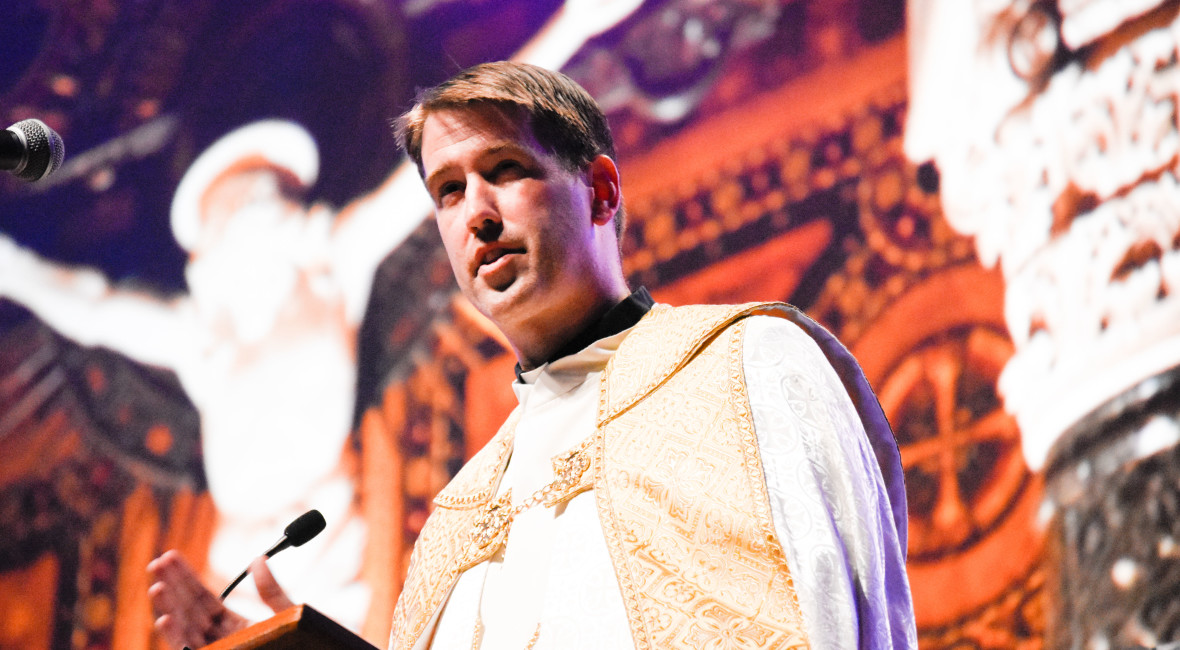
We all long for peace. Yet we often times look for peace in the wrong places and in the wrong ways. We think that we can quench our thirsts in other people and other things. Fr. Chris Martin called us to recognize the ways in which we forget that God really is the one who brings us peace and can quench our thirst. He encouraged us to identify these ways that we have fallen short of loving God, our family and friends, and ourselves and to ask for forgiveness in the Sacrament of Reconciliation.
Placing Yourself in God’s Love
Fr. Martin first directed our attention to be aware of the great love God has for each of us, even with our thirstiness and our messiness. One of the hardest things for us to receive and to believe as a people of faith is that we can simultaneously be a sinner and be unconditionally loved by God. As Pope Benedict XVI said, “Jesus came to give God a face for us to look at.” Pope Francis then takes this a half-step further: “In Jesus is the face of the Father’s mercy.” Before we can look at our brokenness, we need to see ourselves with the eyes of love and mercy with which God looks at us.
Seeking Peace in Things That Fail to Satisfy
Fr. Martin pointed out that one of the things that pains God the most is not so much that we make mistakes but that we don’t trust Him enough to run straight back to Him. Instead we try to hide from Him, running away from His presence in the Eucharist, trying to find peace in other ways such as seeking popularity, needing to be the best athlete, or making an idol of a girlfriend or boyfriend.
Fr. Martin also asked us to consider the times we have not loved others, choosing to take them for granted or using them as objects instead of reflections of God’s grace. We choose to use our voices to cut down others or to lie. At times we act out of insecurity and jealousy. We think these things will satisfy our thirst but find that we are unfulfilled.
Finding Peace in Truth
Fr. Martin’s talk was both challenging and comforting. Like me, you probably don’t like thinking about the ways we have not done what we know we should have or where we failed to respond like Jesus would. Yet there is a deep peace that comes from acknowledging what is true.
Like Fr. Martin, I remember getting in trouble as a kid and trying to hide it from my parents. On one hand, it seemed like a perfectly reasonable thing: if my parents didn’t know, I wouldn’t be in trouble. But I remember also being in dread and fear that my parents would find out, or worse, already knew.
In a similar way, I also tried to hide my failings from God. As I grew older, I realized that that made as much sense as the childhood version of myself trying to hide from my parents. God already knows the areas where we excel and the areas where we fall short; we are only deceiving ourselves and are unable to find peace or have our thirsts quenched.
When I’m able to courageously look at myself in the way that God sees me, both the good and the bad, I am able to find true peace because I am able to walk hand-in-hand with God. I don’t have to wonder where I stand with God, because in the Sacrament of Reconciliation, I can actually hear Christ’s words, absolving me of my sins. In the Sacrament of Reconciliation, I am reminded that I am not alone in striving for holiness: God’s grace is always with me and the church is there to accompany me on the road to Heaven.
Quotables
“We should never contemplate our own brokenness…until we have placed ourselves in the loving gaze of God.”
“Pray for the grace to believe you are the beloved.”
“One of the hardest thing to receive and believe as a people of faith is that I can both be a sinner and be unconditionally loved by God. That’s the divine wrestling match our entire life.”







Leave a Comment